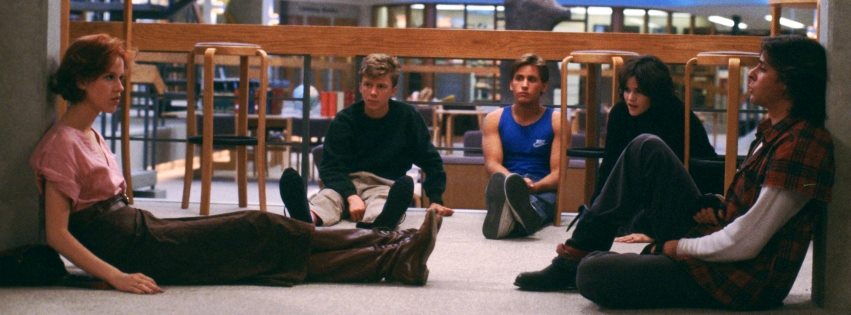
Film Critic Deeta Mahbubani takes a look back at 1985’s The Breakfast Club, finding it a touching portrait of the contradictions of youth
Settling in to watch “The Breakfast Club,” I found myself immediately drawn into the microcosm of high school life, where the rigid social hierarchy unfolds with gripping intensity. Five archetypal students, each embodying a stereotype, converged in Saturday detention: Brian, “the brain” (Anthony Michael Hall); Andrew, “the athlete” (Emilio Estevez); Allison, “the basket case” (Ally Sheedy); Claire, “the princess” (Molly Ringwald); and Bender, “the criminal” (Judd Nelson). Their presence in the library was not of their own volition but rather the result of authority’s uncompromising hand.
John Hughes, both writer and director, wasted no time in painting vivid portraits of these stereotypes, each character wearing their societal label like armour. Every gesture and word became a testament to the expectations placed upon them by their peers and parents alike. The jock, the brainiac, the outcast, the princess, and the rebel—all confined within the strictures of societal norms.
The transformation of Allison’s character towards the film’s conclusion left a bitter taste
Yet, as the day unfolded within the library’s walls, these stereotypes began to crack and crumble. Forced into proximity, the students engaged in a delicate dance of power dynamics, posturing and squabbling for dominance. Bender, with his rebellious streak and confrontational nature stood out prominently to me, especially in his clashes with Claire, whose privileged background made her a vulnerable target for his sharp wit and biting remarks.
The tension between Bender and Claire served as a focal point, shedding light on the film’s uneasy underbelly. Bender’s treatment of Claire often veered into uncomfortable territory, with instances of harassment and verbal abuse masked as romantic tension. While the film attempted to present their relationship as complex and multifaceted, I found it challenging to ignore the troubling power dynamics at play, and couldn’t help but think Bender’s belittling behaviour raised serious questions about consent and healthy relationships. What was once perceived as “romantic tension” now feels unsettling and inappropriate, particularly in light of our heightened awareness of these issues.
Similarly, the transformation of Allison’s character towards the film’s conclusion left a bitter taste. The “ugly duckling” trope, where the quirky outcast shed her unusual appearance for a more conventionally attractive one, perpetuated harmful notions of beauty and acceptance. I felt this scene undercut the film’s purported message of embracing individuality, sending the message that conformity was the path to acceptance.
However, amidst these glaring issues, “The Breakfast Club” did manage to shine brilliantly in moments of genuine connection and vulnerability. The iconic “confession” scene stood out as a raw display of the characters’ deepest fears and insecurities, laying bare the universal struggles of adolescence. These moments of honesty resonated with authenticity, offering a poignant glimpse into the inner lives of these teenagers.
Additionally, the movie adeptly navigated themes of parental expectations, societal pressures, and personal demons. Andrew, the star athlete, grappled with the weight of his father’s demands for success, while Brian, the academic overachiever, battled the suffocating pressure to excel. Bender’s backstory, revealed through vulnerable moments, shed light on the trauma and abuse that shaped his rebellious exterior. His defiance towards authority figures, embodied by Vernon, mirrored a deep-seated resentment towards those who had failed him.
What was once perceived as “romantic tension” now feels unsettling and inappropriate
Despite its flaws, “The Breakfast Club” remains a captivating snapshot of ’80s teen culture, encapsulating the angst, rebellion, and longing for connection that defined the era. Its enduring impact lies in its core message of self-discovery and acceptance. As a viewer, I was confronted with the messy, contradictory nature of growing up, with all its highs and lows. While the film’s portrayal of teenage life may have felt dated and problematic, its exploration of identity, friendship, and the quest for belonging remains poignant and relevant, inviting viewers to revisit the universal struggles of youth.
Enjoyed reading this article? Check out these other excellent features from Redbrick Film:
In Defence of: Hollywood | Redbrick Film
The Death of Originality in Cinema and the Surplus of Sequels | Redbrick Film

Comments